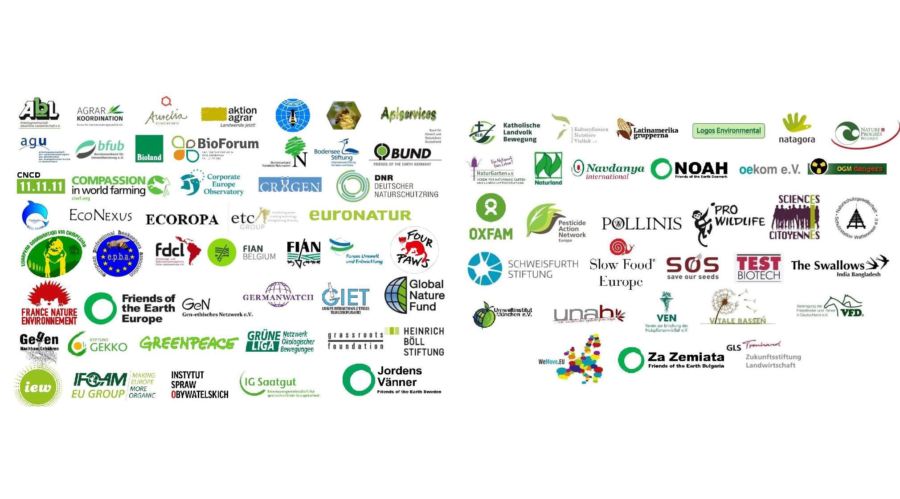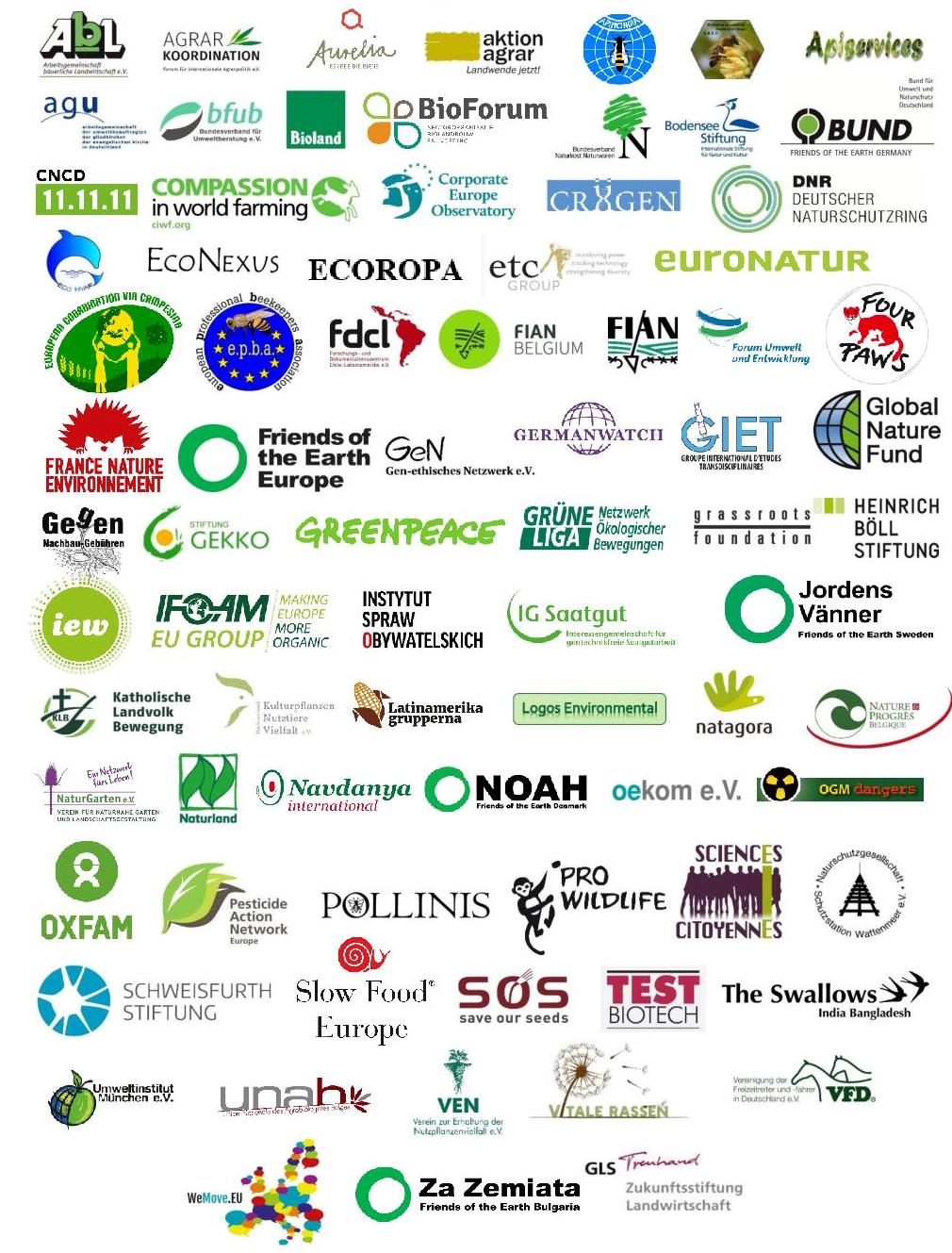
Brussels, 30 / 06 / 2020
Please support a global moratorium on the environmental release of gene drive organisms
Dear Commissioner Sinkevičius, Dear Commissioner Kyriakides,
We, the undersigned civil society organizations, write to you to request that the EU Commission fully supports the EU Parliament’s call for a global moratorium on the release of Gene Drive Organisms (GDOs). This is in view of the EU preparation for the upcoming Conference of the Parties (COP15) to the Convention on Biological Diversity (CBD) and the Cartagena Protocol on Biosafety (COP-MOP10). In its resolution of January 2020, the Parliament requests, “the Commission and the Member States to call for a global moratorium at the COP15 on releases of gene drive organisms into nature, including field trials …“i.
Gene Drive technology aims at the eradication of populations and even entire species by means of genetic engineeringii. Currently, reversal of its effects is not possible. The environmental release of Gene Drive Organisms poses serious and novel threats to biodiversity and the environment at an unprecedented scale and depth, since any Gene Drive Organism carries a serious risk of uncontrollable spread of genetically modified genes and genetic mechanisms into wild and domesticated populations. While the new Corona virus is a very different phenomenon, it stands as a stark warning for the need of precaution regarding the potential effects of the uncontrollable spread of a new organism.
Any environmental release of Gene Drive Organisms would violate the EU’s GMO directive 2001/18/EC, which states: “Member States shall, in accordance with the precautionary principle, ensure that all appropriate measures are taken to avoid adverse effects on human health and the environment which might arise from the deliberate release or the placing on the market of GMOs.”iii
The technology is incompatible with the Commission’s proposed EU strategy on biodiversity protection according to which the EU supports a worldwide commitment for “no human-induced extinction of species”.iv
Furthermore, a report v published by the environmental protection and nature conservation agencies of Austria, Germany, Italy, Finland, Lithuania, Malta and Switzerland highlights possible negative effects of Gene Drive Organisms for the environment and nature, including irreversible changes to food chains and ecosystems, and losses of biodiversity.
Also, the European Network of Scientists for Social and Environmental Responsibility (ENSSER), based on the findings of their reportvi, recommends that, in light of the unpredictabilities, the lack of knowledge and the potentially severe negative impacts on biodiversity and ecosystems, any releases (including experimental) of Gene Drive Organisms into the environment be placed on hold to allow proper investigation until there is sufficient knowledge and understanding.
Given the EU’s GMO Directive, the EU’s policy and strategy on biodiversity, the opinion of environmental agencies of EU Member States, scientific evidence and of course the Parliament’s resolution, we urge you to take into account the need for a global moratorium on any environmental release of Gene Drive Organisms.
The undersigned organizations are of course ready to provide any additional information that you or your staff might need.
Yours sincerely,
On behalf of the undersigning organizations Jorgo Riss
Greenpeace EU
Jagoda Munic
Friends of the Earth Europe
Benedikt Härlin
Save Our Seeds / Zukunftsstiftung Landwirtschaft
Attached:
Briefing: Why a global Gene Drive moratorium is necessary. By Save Our Seeds
Executive Summary of “Gene Drives: A report on their science, applications, social aspects, ethics and regulations.” Published by the European Network of Scientists for Social and Environmental Responsibility (ENSSER), Critical Scientists Switzerland (CSS) and the Federation of German Scientists (VDW) in 2019.
Signatories

| Compassion in World Farming | EU |
| Corporate Europe Observatory (CEO) | EU |
| Ecoropa | EU |
| European Coordination Via Campesina (ECVC) | EU |
| European Professional Beekeepers Association (EPBA) | EU |
| Friends of the Earth Europe | EU |
| Greenpeace EU | EU |
| IFOAM EU | EU |
| Pesticide Action Network Europe (PAN Europe) | EU |
| Slow Food Europe | EU |
| WeMoveEU | EU |
| Bioforum Vlaanderen | Belgium |
| CNCD 11.11.11 | Belgium |
| FIAN Belgium | Belgium |
| IEW – Inter Environnement Wallonie | Belgium |
| Natagora | Belgium |
| Nature et Progrès Belgium | Belgium |
| UNAB – Union Nationale des Agrobiologistes Belges | Belgium |
| Vitale Rassen | Belgium |
| Za Zemiata – Friends of the Earth Bulgaria | Bulgaria |
| Eco Hvar | Croatia |
| NOAH – Friends of the Earth Denmark | Denmark |
| Apiservices – Beekeeping Development | France |
| CRIIGEN – Comité de Recherche et d’Information Indépendantes sur le Génie Génétique | France |
| France Nature Environnement | France |
| GIET – Groupe International d’Etudes Transdisciplinaires | France |
| OGM Dangers | France |
| Pollinis | France |
| AbL – Arbeitsgemeinschaft bäuerliche Landwirtschaft | Germany |
| Agrarkoordination | Germany |
| Aktion Agrar | Germany |
| Arbeitsgemeinschaft der Umweltbeauftragten der Gliedkirchen in der evangelischen Kirche Deutschland |
Germany |
| bfub – Bundesverband der Umweltberatung | Germany |
| Bioland | Germany |
| BNN – Bundesverband Naturkost Naturwaren | Germany |
| Bodensee Stiftung | Germany |
| BUND – Friends of the Earth Germany | Germany |
| Dachverband Kulturpflanzen- und Nutztiervielfalt | Germany |
| DNR – Deutscher Naturschutzring | Germany |
| EuroNatur | Germany |
| FDCL – Forschungs- und Dokumentationszentrum Chile Lateinamerika e.V. | Germany |
| FIAN Deutschland | Germany |
| Forum Umwelt und Entwicklung | Germany |
| GeN – Gen ethisches Netzwerk | Germany |
| Germanwatch | Germany |
| GRÜNE LIGA Bundesverband | Germany |
| Heinrich Böll Stiftung | Germany |
| Katholische Landvolkbewegung Deutschland | Germany |
| Naturgarten | Germany |
| Naturland | Germany |
| oekom.e.V. | Germany |
| Oxfam Deutschland | Germany |
| Pro Wildlife | Germany |
| Schutzstation Wattenmeer | Germany |
| Schweisfurth Stiftung | Germany |
| Stiftung Gekko | Germany |
| Stiftung Grassroots | Germany |
| Umweltinstitut München | Germany |
| VEN – Verein für die Erhaltung der Nutzpflanzenvielfalt e.V. | Germany |
| Vereinigung der Freizeitreiter und -fahrer in Deutschland e.V. (VFD) | Germany |
| von Weizsäcker, Dr. Ernst Ulrich | Germany |
| Zukunftsstiftung Landwirtschaft in der GLS Treuhand | Germany |
| IG Saatgut | Germany |
| Testbiotech | Germany |
| Apicultural Research Educational Center | Greece |
| Instytut Spraw Obywatelskich / The Civil Affairs Institute | Poland |
| Jordens Vänner – Friends of the Earth Sweden | Sweden |
| Latinamerikagrupperna | Sweden |
| The Swallows India Bangladesh | Sweden |
| ETC Group | International |
| Global Nature Fund | International |
| Navdanya International | International |
| Four Paws | International |
| APIMONDIA Scientific Commission ‘Bee Health’ | International |
| APIMONDIA Scientific Commission ‘Beekeeping for Rural Development’ | International |
| APIMONDIA Scientific Commision ‘Beekeeping Technology and Quality‘ | International |
| APIMONDIA Regional Commission for ‘Americas‘ | International |
| EcoNexus | Science |
| Logos Environmental, Janet Cotter | Science |
i In its resolution of January 2020, (2019/2824(RSP)) the European Parliament considers it important to “improve the status of biodiversity by safeguarding ecosystems, species and genetic diversity” (para. C) and requests “the Commission and the Member States to call for a global moratorium at the COP15 on releases of gene drive organisms into nature, including field trials, in order to prevent these new technologies from being released prematurely and to uphold the precautionary principle, which is enshrined in the Treaty on the Functioning of the European Union as well as the CBD” (para.13). Online: https://www.europarl.europa.eu/doceo/document/TA-9-2020-0015_EN.html
ii Esvelt, K., et al. (2014). Concerning RNA-guided gene drives for the alteration of wild populations. Elife 17(3). // Rode, N., et al. (2019). Population management using gene drive: molecular design, models of spread dynamics and assessment of ecological risks. Conservation Genetics 20: 671-690. // National Academies of Sciences Engineering and Medicine (2016). Gene Drives on the Horizon: Advancing Science, Navigating Uncertainty and Aligning Research with Public Values. Washington DC, The National Academies Press
iii Directive 2001/18/EC on the deliberate release into the environment of genetically modified organisms, Article 4, (1)
iv Communication from the Commission to the European Parliament, the Council, the European Committee of the Regions. EU Biodiversity Strategy for 2030. Brussels, 20.5.2020 COM(2020)380. Online: https://eur-lex.europa.eu/resource.html?uri=cellar:a3c806a6-9ab3-11ea-9d2d-01aa75ed71a1.0001.02/DOC_1&format=PDF
v Dolezel, M. et al. (2019): Gene Drive Organisms. Implications for the Environment and Nature Conservation. Umweltbundesamt, Vienna.
vi CSS, ENSSER, VDW (2019). Gene Drives. A report on their science, applications, social aspects, ethics and regulations. Online: https://genedrives.ch/wp-content/uploads/2019/10/Gene-Drives-Book-WEB.pdf
